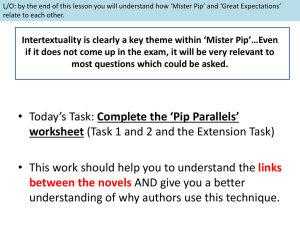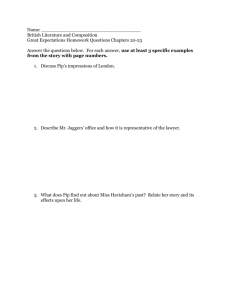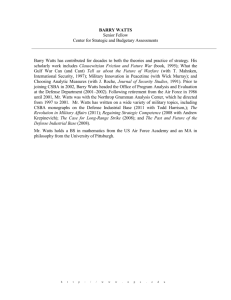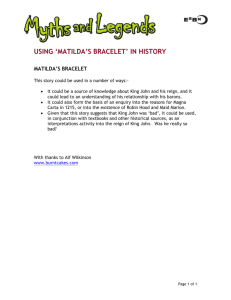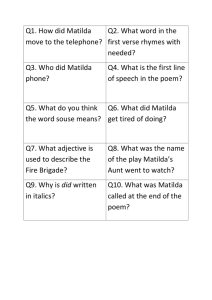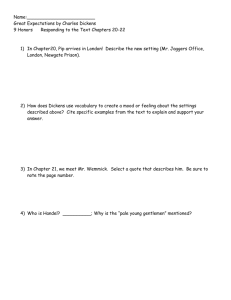Mister Pip - Cloudfront.net
advertisement
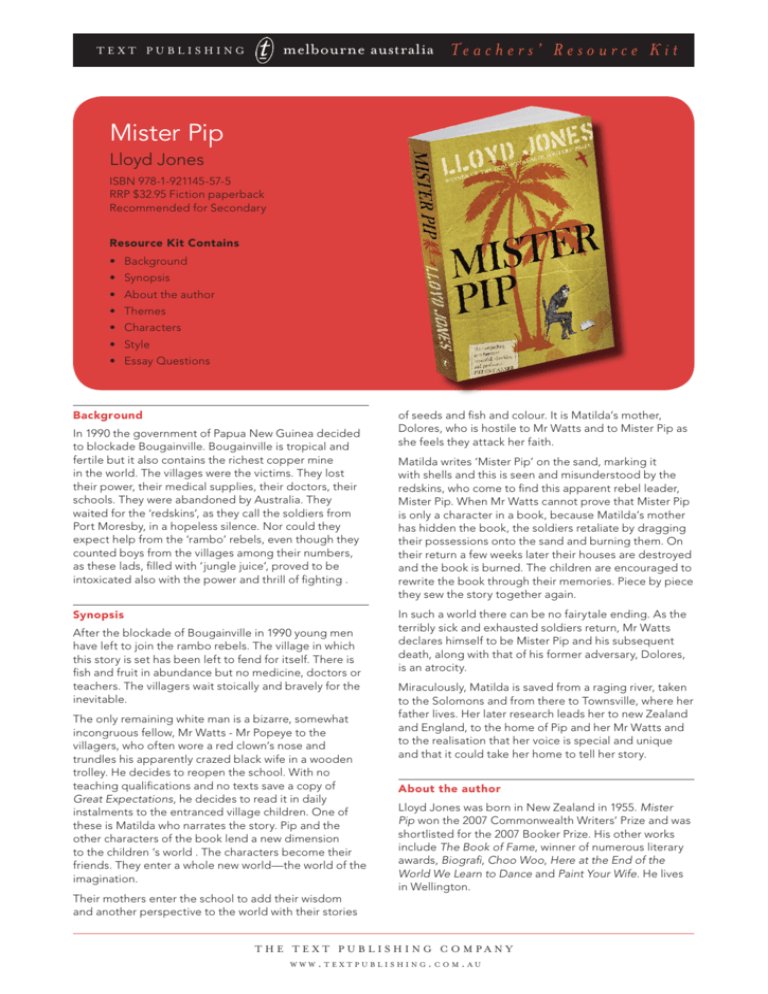
melbourne australia T e a c h e r s ’ R e s o u r c e K i t text publishing Mister Pip Lloyd Jones ISBN 978-1-921145-57-5 RRP $32.95 Fiction paperback Recommended for Secondary Resource Kit Contains • Background • Synopsis • About the author • Themes • Characters • Style • Essay Questions Background In 1990 the government of Papua New Guinea decided to blockade Bougainville. Bougainville is tropical and fertile but it also contains the richest copper mine in the world. The villages were the victims. They lost their power, their medical supplies, their doctors, their schools. They were abandoned by Australia. They waited for the ‘redskins’, as they call the soldiers from Port Moresby, in a hopeless silence. Nor could they expect help from the ‘rambo’ rebels, even though they counted boys from the villages among their numbers, as these lads, filled with ‘jungle juice’, proved to be intoxicated also with the power and thrill of fighting . Synopsis After the blockade of Bougainville in 1990 young men have left to join the rambo rebels. The village in which this story is set has been left to fend for itself. There is fish and fruit in abundance but no medicine, doctors or teachers. The villagers wait stoically and bravely for the inevitable. The only remaining white man is a bizarre, somewhat incongruous fellow, Mr Watts - Mr Popeye to the villagers, who often wore a red clown’s nose and trundles his apparently crazed black wife in a wooden trolley. He decides to reopen the school. With no teaching qualifications and no texts save a copy of Great Expectations, he decides to read it in daily instalments to the entranced village children. One of these is Matilda who narrates the story. Pip and the other characters of the book lend a new dimension to the children ’s world . The characters become their friends. They enter a whole new world—the world of the imagination. Their mothers enter the school to add their wisdom and another perspective to the world with their stories of seeds and fish and colour. It is Matilda’s mother, Dolores, who is hostile to Mr Watts and to Mister Pip as she feels they attack her faith. Matilda writes ‘Mister Pip’ on the sand, marking it with shells and this is seen and misunderstood by the redskins, who come to find this apparent rebel leader, Mister Pip. When Mr Watts cannot prove that Mister Pip is only a character in a book, because Matilda’s mother has hidden the book, the soldiers retaliate by dragging their possessions onto the sand and burning them. On their return a few weeks later their houses are destroyed and the book is burned. The children are encouraged to rewrite the book through their memories. Piece by piece they sew the story together again. In such a world there can be no fairytale ending. As the terribly sick and exhausted soldiers return, Mr Watts declares himself to be Mister Pip and his subsequent death, along with that of his former adversary, Dolores, is an atrocity. Miraculously, Matilda is saved from a raging river, taken to the Solomons and from there to Townsville, where her father lives. Her later research leads her to new Zealand and England, to the home of Pip and her Mr Watts and to the realisation that her voice is special and unique and that it could take her home to tell her story. About the author Lloyd Jones was born in New Zealand in 1955. Mister Pip won the 2007 Commonwealth Writers’ Prize and was shortlisted for the 2007 Booker Prize. His other works include The Book of Fame, winner of numerous literary awards, Biografi, Choo Woo, Here at the End of the World We Learn to Dance and Paint Your Wife. He lives in Wellington. the text publishing company www.textpublishing.com.au Mister Pip Lloyd Jones Themes There are many themes in Mister Pip but before they can be discussed we must consider two points: • the integrity of the book rests on the probability of remote islanders responding to a story set in nineteenth century England and • the morality of attempting to impose an alien culture on the children of Bougainville in a world which has reverted to the one which existed before white man came. Firstly, Mr Watts sees the need to distract the children from an atmosphere of brutality and fear. But the world of the marshes and Victorian London that Pip inhabits is equally as foreign to young Australian teenagers and yet visionary teachers have read the book aloud to children who became entranced by the story. There is nothing improbable about his action. Anyway, all other teaching aids had gone with the blockade. This book offers an escape into another world. Secondly, readers may worry about the fitness of Mr Watts bringing a foreign and very white culture into the lives of black children. However the feisty villagers prove that they are their own people. They will not be pushed into new ideas against their will. These people have integrity. In any case they had already been exposed to missionaries, foreign technology and it would appear that the young men who called themselves ‘rambos’ had been open to television, for good or for ill. The villagers appear resilient and able to defend themselves against alien ideas of which they do not approve. The cultural diversity works in two ways. The mothers who visit the school bring with them their wisdom to share. They open eyes to the beauty of their life, the colour blue, songs and remedies, what may be learnt from crabs , the traditional way of cooking turtles and pigs, their morality and thoughts about sex, their own views of the world. There may be anger on Dolores’ part that Mr Watts does not believe in the devil, but he loves his wife who also believes in the devil. He is tolerant of Dolores’ belief although he would like to argue with her, but she is not open to debate. The power of books and words ‘But you know, Matilda, you cannot pretend to read a book. Your eyes will give you away. So will your breathing. A person entranced by a book simply forgets to breathe. The house can catch alight and a reader deep in a book will not look up until the wallpaper is in flames. For me, Matilda, Great Expectations is such a book. It gave me permission to change my life.’ (p 135) Mister Pip shows how books can change lives. It opens windows to a new world where you can meet new people. Te a c h e r s ’ R e s o u r c e K i t Matilda found a new friend in Pip. Through Pip she had learned to enter the soul of another. Most importantly she had discovered that other people in another time and another place had suffered as she did. Neither she nor Pip had known their fathers since the age of eleven. Pip knew death as the village children did. Just as Pip seemed squashed between his awful sister and Joe , so did Matilda feel trapped between her hostile mother and Mr Watts. She learns that things can suddenly change as they had for Pip. There would be no warning. This is borne out in the dreadful changes that come to the village through the actions of both the soldiers and the rebels. The children are transported to another time and another world but they learn the universality of good literature. The people in Dickens’s work know suffering, too. The children can understand only too well the fear of Pip in the foggy marshes, his sense of being abandoned, the insensitive needling of Mr Pumblechook. Books stop us from being alone. They help us to realise that there are other people in the world who understand our feelings. They also help us to know ourselves and why we think and act as we do. By questioning the behaviour of Pip in London we learn to question our own behaviour and thinking and that of those with whom we live. Books open the imagination to another world and to the minds and souls of other people. To the people who live in this brutal and abandoned world it is a possible means of redemption. As they rebuilt Great Expectations the children were rebuilding themselves a new life. p128 Stories may be stored in the memory and recovered. They may be lived over again. Once read, they cannot be destroyed. Mr Watts read slowly so that they could ‘feel the shape of each word.’ (p18) But he is not the only one on the island who understands the power of words to express our innermost spirit. Dolores, although seeing Great Expectations as the word of the devil, was not immune to the power and beauty of language. ‘And God said, Let there be light. And there was light. There is no sentence in the world more beautiful than that one.’ (p38) Daniel’s frail and brave grandmother says she knows nothing about Egypt. But she does know about the colour blue. And we see she knows about the power of language. Lyrically she tells us that, ‘Blue is the colour of the Pacific. It is the air we breathe. Blue is the gap in the air of all things, such as the palms and iron roofs. But for blue we would not see the fruit bats. Thank you God for giving us the colour blue.’ (p51) And Gilbert’s father says, ‘When you read the work of a great writer,’ says Mr Watts, ‘you are making the acquaintance of that person.’ (p18) ‘At night the blimmin’ dogs and roosters chase after dreams and break them in two. The one good thing about a broken dream is that you can pick up the threads of it again.’ (p52) ‘Mr Watts had given us kids another world to spend the night in.’ (p20) The rambo rebels show little poetry in their drunken, dangerously aggressive behaviour. Yet they too are www.textpublishing.com.au 2 Mister Pip Lloyd Jones subdued for seven nights while Mr Watts charms them with the story of his life. It did not last long for them. However at the end of the story they melted away. ‘All that story had got up and run off into the night.’ (p172) However stories can be subversive. They may be dangerous when taken literally. Dolores is sure of this in terms of morality while the soldiers see Pip as a supreme threat to their cause without having the faintest idea who he is and without wanting to listen to any explanation. Discuss how reading a book has changed your view of the world. Living in war The people of Bougainville live in a tropical paradise, lush with fruit and vegetables and with a sea thick with fish. Yet they live in a state of suspension, forever waiting, listening for the helicopters, hiding and knowing that inevitably they will be found. Their peaceful, innocent lives are shaken by brutality and unspeakable atrocities. Babies die of malaria because of no medicine; they have been abandoned by the white people. ‘White men were to blame for the mine and the blockade. A white man had given us the name of our island. White men had given me my name. By now it was also clear that white men had forgotten us.’ (p41) The waiting for the worst to happen is endless. It feels like a rehearsal for the ultimate and inevitable horror that has to come. They are trapped. There is no physical escape, only the escape into the world of the imagination. ‘This is what happens, you wait and wait. Until you wish the redskins would just come so that the waiting can be over.’ (p82) Courage and bravery Grace’s funeral (pp122-3) shows the compassion of the villagers as they recall the Grace they knew, filling in a picture of Mr Watts’s dead wife that he had never known. They speak of her with respect and admiration. When the villagers lost all their possessions, they found ways to console themselves by remembering that the fruits were still in the trees and the fish were still in the sea. They had lost irreplaceable things but ‘you never knew a single coconut could have so many uses.’ (p96) When they lost their houses a few weeks later, they lost their memories, their privacy and their sense of containment but they did what they could with what they could find. They maintained bravely that they still had the sea and the sky and the beautiful air that they breathed. The children courageously built up, phrase by phrase, fragments of the book which had been burnt. They would not let the book become extinct. They willed themselves to remember. When the ever slow Daniel admitted to seeing the barbaric treatment of Mr Watts, his frail grandmother www.textpublishing.com.au Te a c h e r s ’ R e s o u r c e K i t went with him when the soldiers took him into the jungle to his death. How did Mr Watts and Dolores show great courage when faced with the soldiers on pp173–181? Characters The characters in this book are presented very visually. We know Dolores is angry because of the green scarf she wears like a bandanna. The very first page of the novel grasps our attention with its vivid colour and its quick delineation of a character. We also learn about the characters from what they say and from their tone of voice. Voice is an important element of this book. The children are told they must find their own voice. We are told the story through Matilda’s voice so there is no third person to tell us what a character is thinking . Therefore you must read this book watching and listening. How do the characters move? What are they saying? How are they saying it? Mr Watts Our first impressions of him are almost as a bizarre figure. He is a source of mystery and a figure of fun because of the way we see him. His eyes bulged ‘like they wanted to leave the surface of his face.’ (p1) Some days he wore a clown’s nose on an already big nose. And when he wore the clown’s nose, ‘you found yourself looking away because you never saw such sadness.’ (p1) ‘He is white as the whites of your eyes, only sicker.’ p3. He had long hair and a long beard - almost like an old-fashioned picture of God. He was ‘too large for the room.’ (p13) Yet he wore an old white suit in the classroom and shorts on the beach and ‘he looked like a skinny old vine.’ (p59) Despite his unprepossessing appearance, he has a tremendous sense of presence. He even quelled the drunken rambo who threatened to rape him. Mr Watts is seen as alien, mysterious and yet important by the villagers. How is this shown in Chapter 1? He was a consummate story teller, a conjuror who whipped stories and ideas out of the air. ‘When he spoke we shut up.’ (p15) He gave their lives substance in a very brutal and uncertain world. He was able to instil a sense of future where the only certainty seemed to be the arrival of the soldiers bearing death, destruction and atrocity. He said of the classroom that ‘I want this to be a place of light.’ (p14) He believed that ‘with your parents’ help we can make a difference to our lives.’ (p15) Mr Watts treated all of the villagers with respect. He wanted to know their names and he addressed them as individuals. He had an understanding and tolerance of humanity with all its foibles. He agreed Estella was mean but reminded Matilda that there may have been a reason for her behaviour that we don’t as yet understand. He teaches Matilda why Pip should be forgiven for his treatment of Joe Gargery. 3 Mister Pip Lloyd Jones ‘It is hard to be a perfect human being, Matilda,’ he said. ‘Pip is only human. He has been given the opportunity to turn himself into whomever he chooses. He is free to choose. He is even free to make bad choices.’ (p 61) Did you think Mr Watts made the wrong choice in marrying Grace and in staying in Bougainville? Give your reasons for this. Matilda sees him as ‘stuck.’ He is a white man in a black man’s world. p50. He was certainly an unknown quantity because they could not imagine where he came from even after he told his story. Dolores certainly saw him as a heathen and therefore never to be trusted, especially when he denied the existence of the devil. And yet he had a very strong sense of morality. He claimed that to be human is to be moral ‘and you cannot have a day off when it suits.’ (p181) Nowhere is this shown more than in his taking responsibility for the pillaging and later burning of the houses. ‘Pip is a confusion that I failed to see coming until it was too late. I am so sorry.’ (p93) ‘Even after the redskins burned all the houses he still maintained that what was left was of most value.’ (p107) And so he gave them all ‘another room to lounge round in. The next stage was to furnish it.’ They were to do this by retrieving Great Expectations through their memories. They would recall it piece by piece and stitch it together again. This way they might get themselves another life. Dolores would have been pleased with Mr Watts’s explanation that ‘we know the devil because we know ourselves. And how do we know God? We know God because we know ourselves.’ (p164) In these chapters Matilda says that Mr Watts ‘was shining our experience of the world back at us.’ He was giving the villagers something of themselves back in the shape of a story. Why do you think Mr Watts told the soldiers that he was Mr Dickens and then, in that terrible fatal scene, that he was Mister Pip? When Matilda visits New Zealand as an adult we discover that Mr Watts had come to the stillness, colour and beauty of Bougainville from Wellington which had ‘the shock of brick in every direction,’ and he had lived in one of many ‘cold, wind-bashed houses with dried up gardens’. It is a place of guarded windows, of antagonism and even of a ‘resentful cat.’ There were no parrots where Mr Watts came from, just ‘an empty life’, ‘dead air’ and ‘a deadly drag on the heart.’ (p204) We learn of his amateur acting, the origins of the red clown nose and the rumbling trolley on which he carried his wife. We learn, too, that there were no parrots where he came from just silence and ‘dead air.’ (p208) Read p144–169. What new facets of Mr Watts’s life do we learn from his story? www.textpublishing.com.au Te a c h e r s ’ R e s o u r c e K i t What does he mean when he says that he had ‘the hungry eyes of an explorer seeing new territory for the first time‘? (p148) Why did this idea encourage Matilda to think that perhaps her father wasn’t lost after all? What do we learn of Mr Watts’s inherent tenderness from his life story? What does Mr Watts mean when he says that the only hope for Grace is for her to reinvent herself? What do you think is the meaning of the mayfly story? At the end of the story why does he seek out Dolores with a smile? Grace Watts Grace Watts is at first a complete enigma. Is she crazed? Is she ill? To the children she is an exotic, towed along by her husband on a rumbling trolley. The two of them are like a procession. She is proud and holds aloft a blue parasol. It is only at her funeral that we learn from the villagers that she was clever and won a scholarship to Australia, that she was loved by many. It had been convenient to think of Grace as mad, but we learn later from her husband’s story that she suffered from profound depression following the death of their baby daughter from meningitis. The lists she wrote on the spare room wall portray her as wise, poetic and ironic. Matilda was very aware of the spunkiness and humour that was on the wall. ‘Don’t ask your father about hell,’ she tells her unborn child. ‘His geography is limited.’ (p161) It is Mr Watts’s sparring partner, Dolores, who enlightens us all on why Mr Watts reinvented Grace as Sheba. ‘The Queen of Sheba was a very wise black woman who sought out Solomon to see if she could match his legendary wisdom with her own.’ Then reciting from the King James bible she said, ‘She communed with him all that was in her heart….and there was nothing hid.’ (p169) Dolores Dolores is a central character of the novel in as much as she typifies the high moral ground of the fundamentalist Christians of the village. She is feisty and will not give way in an argument even if she may be losing it. She has a frightening authority when she visits the classroom. She is also the unwitting but unrepentant cause of the burning of the villagers’ possessions and later their houses because she has hidden the book which is the only proof for the soldiers that Mister Pip is not a rebel, but a character in a story. She is a bitter and hostile woman who is ‘angry all the time,’ possibly because her husband is safely tucked away in Townsville, protected from her lonely and uncertain life. Matilda says she had a beautiful smile but 4 Mister Pip Lloyd Jones Te a c h e r s ’ R e s o u r c e K i t she hardly ever used it. Instead she was the epitome of anger with ‘lips like slits.’ This anger terrified the other children. Matilda believes that Dolores is like Miss Havisham, stuck in a time that has past and gone. forward to proclaim herself God’s witness to the coldblooded butchery of her old enemy, Mr Watts.’ (p181) Matilda tried to ‘colour in’ the world of Great Expectations for her mother but Dolores was profoundly suspicious of both Mr Watts and Mister Pip. She feared for the morality of her daughter. For her, morality was black and white and she would never condone Pip’s stealing food for the convict. Matilda is the narrator. Although an adult when she recounts the story she is 13 when the story unfolds. She is a faithful narrator and we have already learned a great deal about her from the way she reveals the events and the way she interprets the story. We see the other characters through her eyes. Trapped by a frightening blockade, she cannot understand the war at that age. How could they be sealed off? She was ripe for the promise of a change in her life, for a story that could enthral her and transport her away from the death and horror that threatened her young life. ‘She worried that she would lose her daughter to Victorian England.’ Her other issue with Mr Watts was that he was a white man and white men had stolen her husband. You feel that she harbours bitterness for Grace because Grace won a scholarship to Australia in order to capture a white husband. For her, faith was an intensity of belief and her beliefs could not be shaken. When she came to speak at the school her subjects were faith and prayer so when Mr Watts confessed to not believing in the devil she stormed to the classroom, believing she could bully him into accepting what she believes. (Read again her story of the devil woman on pp 75–77.) Matilda It is seen that Matilda is • Sensitive • Highly intelligent • Precocious • Highly observant • Wise to the subtle innuendos of adult behaviour • Open to new ideas • Able to be herself A terrible fight ensues between mother and daughter when Matilda confesses to believing in Pip but not in the devil. (p78) But the beginning of the real rift between mother and daughter came when Matilda found the missing Great Expectations in the ceiling of their house. Matilda felt betrayed. She realised that her mother’s silence was designed to destroy Mr Watts even if it meant the destruction of the village. She also realised her mother was ‘stuck’. She could not speak up because it would be an admission of her theft. Locate and note examples of these characteristics that you can find in the book. Does your sympathy lie with Dolores or Matilda? Give your reasons. What are the advantages and disadvantages of a first person narrative? How effective is it in telling this particular story? Does it add to the sense of immediacy? She now has to share her mother’s guilt because she could not betray her mother. Her silence cost the villagers their homes. Every now and then, Matilda was granted a glimpse of a Dolores who was ‘her own self.’ ‘Or possibly what she was looking for was floating on a sea of hope.’ (p13) At last in her defence of Mr Watts after his brutal death, her determination to defend the truth leads her to bravely step forward and testify to seeing Mr Watts chopped up and fed to the pigs. She knows only too well that by doing so she will suffer the same fate. ‘He was a good man. I am here as God’s witness.’ (p176) When she is raped, ‘her face had come loose with fear.’ Nevertheless she sacrificed her life to save her daughter from rape. She would not allow her to speak. In the midst of the gross immorality of the soldiers we are reminded of Mr Watts’s words that ‘to be human is to be moral and you cannot have a day off when it suits.’ ‘My brave Mum had known this when she stepped www.textpublishing.com.au Style The story is written in the first person, using the voice of a villager. She is older when she actually writes the narrative but is thirteen when she witnesses the events she describes. It is her enthralment by the story of Great Expectations that particularly moves us. It has been said that it is impossible for a white man to take on the voice of a black woman. Do you agree? The first person narrative is plain speaking, factual but only deceptively simple. It does not have the ‘fancy nancy English talk’ that so exasperates Dolores when she hears Great Expectations. There seems to be nothing here, as in Dickens, ‘used to pretty up a simple sentence.’ Certainly no words are used simply as adornment. The horrific violence is described with a heart rending simplicity. The prose is lyrical, poetic, full of colour and rhythm and light and shade. It is memorable writing which sings, like the voices of the parents who come to speak at the school. They see wonder and music in the everyday things which make up their world and their fears and hopes are woven into their everyday stories. Giselle says,‘Some islands have beautiful names for different winds. My favourite is the wind that is known as “gentle as a woman.” (p52) 5 Mister Pip Lloyd Jones Te a c h e r s ’ R e s o u r c e K i t The mothers talk about how the singing of songs which will make an orange tree grow or cure the hiccups. We are told that ‘blue belongs to the sky and cannot be nicked.’ (p51) Mr Watts says the village women are lucky because they know that ‘while we may not know the whole world, we can, if we are clever enough, make it new.’ (p52) Indeed the close and lyrical relationship between the villagers and the world around them sings to us on every page. The ocean shuffles up the beach and draws out. ‘On the edge of the silvery ocean, a pale thread of moon whispered to me, a new moon was on its way.’ (p170) ‘He was letting me sit in my own pool of insolence.’ (p171) There is the poetry in the lists on the walls of Grace’s spare room: ‘The noise of a bus changing gear two streets away where the road begins to climb all the way back to a moment in childhood.’ (p159) ‘The holy quiet of a man who has lived for seventy-five years on the one island and has nothing left to say.’ (p159) Make a list of words and phrases that particularly resonated with you and briefly give reasons why you chose them. Essay questions 1 What does Matilda mean when she says, ‘Literature doesn’t just offer escape, it can take you home’? In what way does it take her home? 2 Mr Watts was ‘whatever we needed him to be, what we asked him to be. Perhaps there are lives like that— they pour into whatever space we have made ready for them to fill.’ To what degree does Mr Watts fill the spaces made for him by the crisis in Bougainville? 3 What makes Mister Pip a truly universal story—a story of human condition in general? 4 ‘Stories have a job to do. They have to teach you something.’ What does Matilda learn from the narration of Great Expectations.? 5 The destructive nature of war is slow and debilitating to both perpetrators and victims. Do you agree? www.textpublishing.com.au 6
